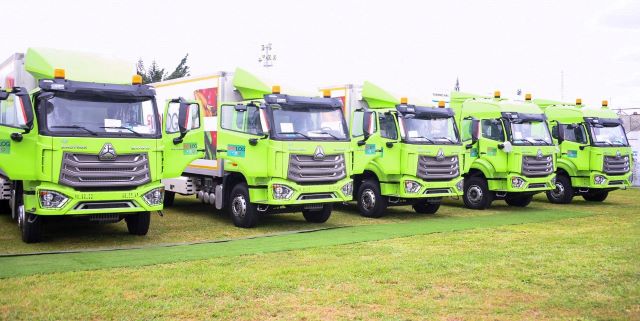The Lagos State Government has inaugurated about 150 40-foot trucks to ease food logistics in and out of the state.
The Lagos State Governor, Mr. Babajide Sanwo-Olu, commissioned the Compressed Natural Gas (CNG)-powered trucks at the launch of the N500 billion ‘Produce for Lagos’ Offtake Guarantee Fund and Programme on Wednesday in Lagos, Southwest Nigeria.
The trucks will transport food from across the country to Lagos in order to reduce post-harvest losses nationwide.
Sanwo-Olu described the initiative as part of President Bola Tinubu’s Renewed Hope Agenda to foster the achievement of food security in the country.
“Lagos is Nigeria’s food market, and we consume over 50 per cent of the food that is traded in the southwest part of the country.
“We have a food economy that is valued at over N6 trillion. It is also noted that Lagos loses 50 per cent of its food largely due to poor storage and inefficient transportation.
“It became clear that we must organise our food systems to feed our people well.
“The ‘Produce for Lagos’ programme will help to create logistics support, and it will help to connect directly to the Lagos dynamic food economy.
“That is why we are launching Ecolog logistics trucks through the Lagos State Food Systems Infrastructure Company,” Sanwo-Olu said.
The governor added that the trucks, when in operation, would help to create a new agricultural ecosystem.
“We are going to launch about 150 40-foot trucks that will serve as a step or test for the smooth movement of food.
“The trucks are all CNG-powered and can travel to all parts of the country on a full tank and return to Lagos without refuelling at any petrol station.
“These trucks are the first of their kind, and it is a big initiative for us as a country and as a state.
“So, for us, the N500 billion is just a tip, and as you can see, some of our friends in the private sector are beginning to show interest.
“What we are doing here is creating a whole new agricultural ecosystem—one that will rise from the demands of today and tomorrow, by combining our policies in a well-focused manner, creating a financial model that will outlive us, and building infrastructure that will serve even future generations, while ensuring we have a robust database that everyone can work with,” Sanwo-Olu said.













